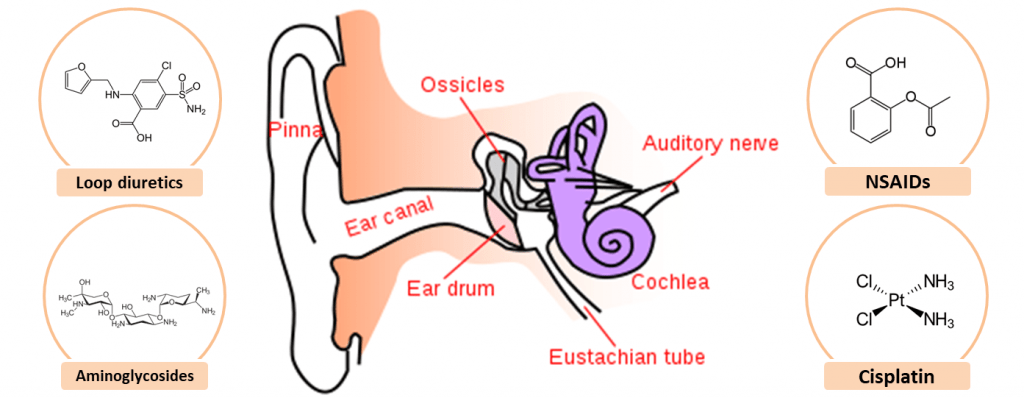
Put in simple words, Ototoxicity refers to ear poisoning. Oto means ear, & toxicity means poisoning. Hence both of these things put together form the term ear poisoning.
It usually occurs from over exposure to chemicals & drugs that damage the inner ear. Or, it can be the vestibulo-cochlear nerve. It is responsible for sending balance & ear information from the inner ear to the brain.
Inner ear serves the dual purposes of hearing as well as balance. Aany disturbance or poisoning in it can lead to problems with both hearing & balance.
The cause & the extent of ototoxicity depends on the drug or chemical that causes it, in addition to hereditary factors.
Ototoxicity can be temporary or permanent. The effects of certain drugs may last for shorter durations. While some others can cause more permanent, lasting damage.
A vast majority of people who complain of ototoxicity suffer from the temporary form of the illness.
Ototoxicity can result in hearing loss & a ringing or buzzing sound in the ears. This is also known as tinnitus. Due to the damage to the cochlea, the part of the inner ear that is also called hearing apparatus.
Which substances can lead to ototoxicity?
Many chemicals & drugs have the potential to cause ototoxicity. Many of these are over-the-counter medications, prescription drugs, & antibiotics that treat specific illnesses. Certain drugs that treat particular conditions like high blood pressure, can also cause ototoxicity.
Aspirin & Quinine, for example, are antibiotics that are known to cause ototoxicity in patients. It take them for longer periods of time.
They are also known to reduce hearing, along with balancing abilities, especially when taken in higher dosages.
Other drugs & chemicals that are known to cause ototoxicity are:
- chloroquine
- quinidine
- quinine (including Q-vel)
- tonic water
Other than these drugs, loop diuretics, also called ‘water pills’ help the body get rid of unnecessary fluid retention. These are also known to cause ototoxicity in patients.
These are also shown to cause ringing in the ears & problems in maintaining balance when taken in higher dosages & for longer periods of time.
The loop diuretics listed below have a higher incidence of causing ototoxicity, especially when taken with certain antibiotics called aminoglycoside antibiotics.
- bumetanide (Bumex)
- ethacrynic acid (Edecrin)
- furosemide (Lasix)
- torsemide (Demadex)
Aminoglycoside antibiotics are a class of antibiotics that are long well-known for their potential to cause ototoxicity if they happen to enter the inner ear. Some of these drugs have more chances of causing hearing loss, while others are more likely to cause vestibular loss.
Along with aminoglycoside antibiotics, anti-cancer drugs like cisplatin & carboplatin are also known to cause massive hearing loss & vestibular loss which is permanent in nature.
Ototoxicity symptoms
The symptoms of Ototoxicity include mild tinnitus & hearing loss, depending on the amount of toxicity & the level of exposure to the toxic chemical.
The hearing loss & the tinnitus can either be in one ear, or both of them.
The symptoms of ototoxicity also depend on the rate at which the poisoning occurs. A slow, one-sided toxicity might not produce very noticeable symptoms. While rapid poisoning in both the ears may lead to severe vertigo, dizziness, imbalance, & nystagmus symptoms that incapacitate a person for many days.
How is Ototoxicity diagnosed?
There is no specific test to diagnose the signs of ototoxicity. The diagnosis is usually made on the basis of the symptoms of ototoxicity experienced by the patient. It comes along with a detailed history of their exposure to any toxic chemicals or drugs.
The tests utilized to diagnose Vertigo like the vestibular autorotation test (VAT), vestibulo-ocular reflex testing equipment (VORTEQ), electronystagmography (ENG), computerized dynamic posturography (CDP), rotary chair (SHAT), head-shaking, electrocochleography (EcoG), auditory brainstem response (ABR), otoacoustic emissions, pure tone audiometry, etc. can be used to diagnose ototoxicity.
Ototoxicity treatment
As of present, there are no specific treatment options available to treat or reverse permanent ototoxicity damage. Treatment for ototoxicity usually focuses on managing the hearing & vestibular loss, as well as rehabilitation of a person’s hearing & vestibular capacities.
This can achieve through medicines, vestibular rehabilitation therapies, & hearing aids to help the patient carry out their everyday activities.
Patients with extensive damage to both the ears can benefit from cochlear implants, while less severe cases may be treated with hearing aids.
Similarly, for patients with irreversible vestibular loss, therapies that focus on regaining certain vestibular control through the remaining working senses may be the way forward, while less severe cases may be treated with the help of certain anti-nausea, anti-dizziness medications & vestibular rehabilitation exercises.